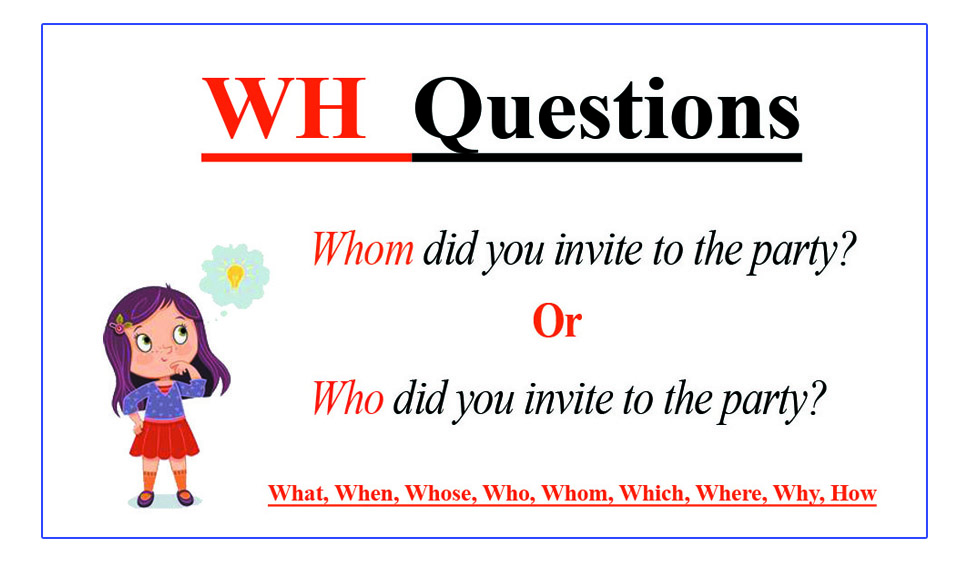WH questions are very common in English and we use it in our daily conversation. If you want to get some information about someone or something you ask by the help of WH questions. In other words WH Questions are words that include the letter ‘W’ and ‘H’, we use them to ask certain types of questions. The lesson below shows how to use WH questions in English correctly.

WH Questions in English
There are many WH questions in English. We use them to ask for information and the answer cannot be yes or no. Here’s what they are and how they are used:
1. What
Used in questions to ask for information about somebody or something.
• What is your name?
• What do you know about WH questions in English?
Used when you have not heard or have not understood something.
• What? I didn’t hear what you said.
• They did what?
2. When
Used to ask about time.
• When did you last see him?
• When can I see you?
3. Where
Asking in or to what place or situation.
• Where do you live?
• Where is your home?
4. Which
Used to ask about choice.
• Which is better exercise- Swimming or tennis?
• Which color do you like?
5. Who
Used to ask about the name, identity or function of one or more people as a (subject).
• Who is your favorite teacher?
• Who’s the money for?
6. Whom
Used to ask about which person or people as the object of the verb or preposition.
• Whom did they invite?
• To whom should I write?
Click here to learn how to use “who and whom” correctly.
7. Whose
Used to ask about ownership.
• Whose house is that?
• Whose opinion do you accept?
8. Why
Used to ask the reason for or purpose of something.
• Why were they late?
• Why do we learn ESL.
9. How
Used to ask in what way or manner.
• How does it work?
• How are you?
10. How many
Used to ask about quantity (countable)
• How many students are there in the class?
• How many chairs are there?
11. How much
Asking about quantity or amount (uncountable)
• How much money do you want?
• How much time have we got?
12. How long
Asking about duration or length.
• How long have you been teaching English?
• How long will it take?
13. How often
Frequently
• How often do you have English class?
• How often do they go to the cinema?
14. How old
Age
• How old is she?
• How old are you?
15. How come
Asking for reason or asking why.
• How come I can’t participate?
• How come they didn’t come at the party?
How to form WH questions?
We usually form WH questions as follow:
1. WH question + an auxiliary verb (be, do or have) + subject + main verb.
• When are we leaving?
• Where do they live?
• What have you bought?
2. WH question + model verb + subject + main verb.
• Where should I put?
• When will they arrive?
Note: when “what, who, which or whose is the subject or part of the subject, we don’t use the auxiliary.
• Whose phone is ringing?
• Who writes good compositions?
Negative WH questions
We use the auxiliary verb “do” when there is no other auxiliary to ask negative WH questions, even when the WH word is the subject of the sentence.
• Who wants to participate in the contest?
• Who doesn’t want to participate in the contest?
• Whose plan worked?
• Whose plan didn’t work?
• Who shouldn’t come with us?
WH word at the end of a statement
We sometimes turn WH question in English into statement questions. We do this, especially when we are checking information that we have already been given, or when we want to quickly check a particular detail. Remember these are less formal than full WH questions.
• We are having a match with whom? (More formal than” whom are we having match with?)
• You are teaching here till when? (More formal than “till when are you teaching here?)
Using prepositions and particles with WH words
We can use WH words and phrases after prepositions in more formal questions. In addition, in an informal style, especially in speaking, the preposition can be separated and placed at the end of the question clause.
• Where are they coming from?
• From where are they coming? (More formal)
• Whom should I give it to?
• To whom should I give it? (More formal)
When we make questions shorter, we usually put the prepositions and its complement together.
• A: We will go there.
• B: For what? Or at what time?
